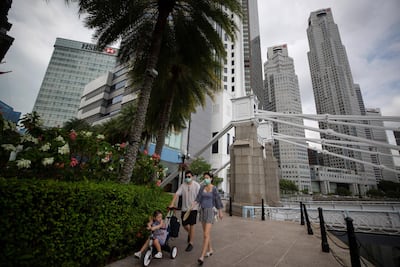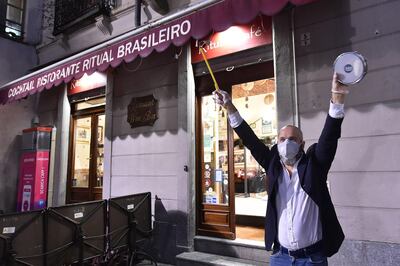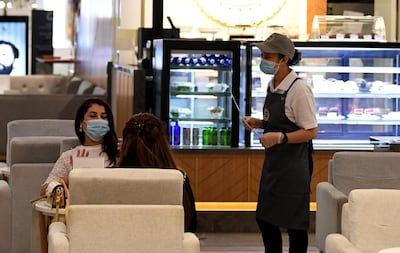There is no doubt the novel coronavirus continues to be a challenge for the world's healthcare systems. Without careful rethinking, our response – which has been blanket shutdowns in almost all of continental Europe and parts of the US – may create a second Great Depression.
All over Europe, and in all major cities in the US, there has been a near total loss of commerce and economic life. Healthy people as well as the more vulnerable are forced to stay home. Businesses have shut down. People have been laid off and we are in the midst of an economic crisis.
Financial markets, seeing this coming, are already in free fall and the credit market is faltering.
Suddenly, we have gone from “recession proof” (a prediction touted for the US as late as February) to a “global recession”.
We will soon have the trifecta of crises: the health crisis, an economic crisis, and as a reflection of that, a financial crisis. Unlike the global financial crisis of 2008 which originated from the financial market and dragged the economy down, this crisis will originate from the real economy.
Financial meltdown is only the symptom.
This scenario has already emerged and spread nearly as fast as the virus: unemployment has increased sharply in the US in the past month.
Major global airlines have announced cuts of over 95 per cent, Lufthansa and Cathay Pacific, to start with. Car manufacturing has come to a halt.
There appears to be no end in sight to the shutdown. Governments are issuing shut down orders “until further notice” or that a scheduled shutdown will be extended.
The British Prime Minister Boris Johnson, back at work after recovering from Covid-19, said that we can contain the virus within 12 weeks – an entire quarter of a year.
The most frightening part, however, is this: viral infections come in waves. Countries like Singapore are already experiencing a second wave. A bit of history will be sobering.
During the 1918 Spanish Flu pandemic, there were three waves of the virus in short succession; the later waves were far more lethal than the first.
The second and the third wave accounted for much of the 50 million death toll worldwide.

So after a lengthy shutdown, our population will still have no immunity. Absent a vaccine and an effective treatment, we have no defence when the virus hits a second time – perhaps this coming winter. Will we have a second and a third global shutdown?
Therefore, leaders worldwide must rethink our coronavirus strategy. Lengthy shutdowns will lead us to an abyss that no one has experienced and so no one can fathom. The shutdown seems to have worked in China but the West simply cannot copy fully China's method.
In China, the government’s command and control can mobilise resources and requisition assets like no western government can. The economic losses are borne by the state. In the West, they will be borne by entrepreneurs, businesses and families.
But we must note that even in China's case, the government made sure that the shutdown for the rest of the country outside Hubei Province was only for three weeks. The shutdown started on January 24, the eve of the Chinese New Year and workers were requested to start reporting back to work on February 10.
By then, however, the rational choices of individuals and private companies ensured that people practiced social distancing and business practices were adapted to move as much work as possible online.
The US and the European governments are ready to spend trillions of dollars to backstop the crisis. But with a prolonged shutdown, these sums are simply insufficient. Prolonged shutdowns that obliterate 80 per cent of economies simply do not have a price tag. It is existential.
A blunt shutdown of three to four weeks has been necessary to "flatten the curve" as early opportunities of containment through testing and tracing were lost. But beyond that period, leaders worldwide should consider a different approach. This approach should involve first and foremost, bolstering the defence of the most vulnerable population: nursing homes.
Second, vastly increase testing capacities. The experience of South Korea, which brought the virus under control without the China-style shutdowns, and of the tiny Italian village of Vo Euganeo, in northern Italy – which blanket tested its 3,600 residents, found a three per cent infection rate but through tracing and isolation achieved a zero infection rate in three weeks – which proves that testing and tracing are key. It allows us to learn where the enemy is and focus our resources on those at risk.
Third, encourage normal economic activities to resume. In other words, end and not extend hard shutdowns.
But to control the spread of the virus, people who are sick and those with pre-existing conditions and at high risk of severe infection should be kept out of work. Governments should backstop their lost incomes.

In essence, after a blunt shutdown, allow the wisdom of crowds to take place. Have faith that the rational choice by individual workers and employers will lead to the right outcome. The shutdowns will have educated people of the risks of the virus and collectively they will make the right decisions.
Extensive testing should identify and isolate additional infections quickly. In the absence of a vaccine and an effective therapy, allowing the young and healthy population to be exposed to the virus in a controlled fashion is vital for our future defence against additional waves of the virus.
Finally, use this opportunity to increase investment in infrastructures, in both physical capital and intellectual capital, to lay the foundation for economic revival.
Invest in the healthcare facilities, pharmaceutical and biotech research and manufacturing capabilities to bolster our defence against future viral attacks.
US President Donald Trump likes to say that "we will roar back like never before", referring to life after the coronavirus crisis. But if we cut too much healthy tissue and muscle of the economic body in the effort to contain the virus, we will not be able to roar back.
Lily Fang is professor of finance and AXA Chair in Financial Market Risk at the INSEAD campus in Fontainebleau, France


